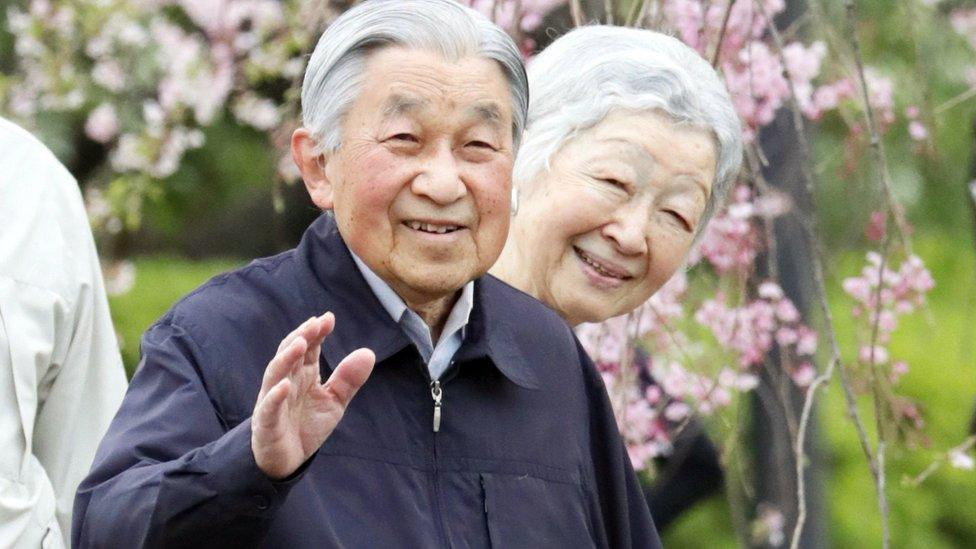Naruhito: Will Japan's crown prince be a 'fresh breeze' for the monarchy?
- Published
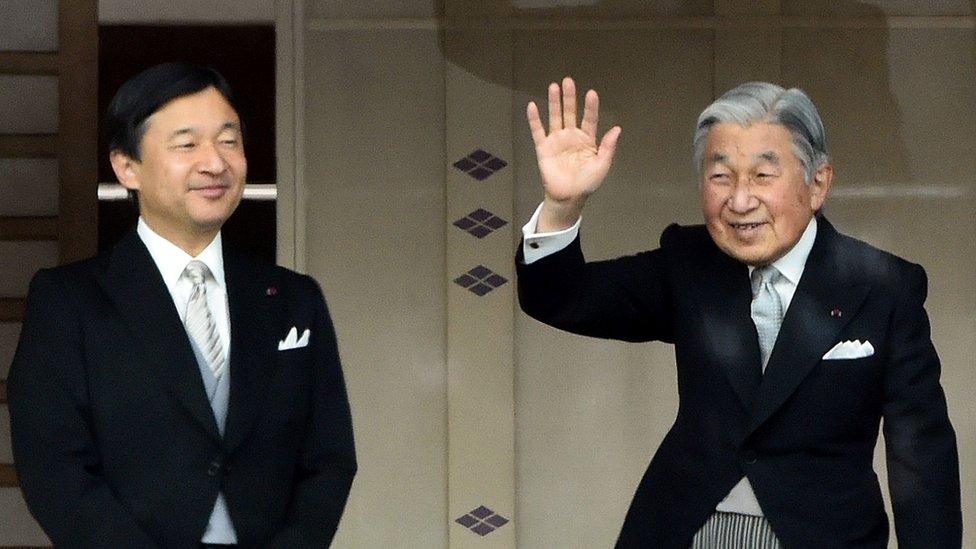
Crown Prince Naruhito (L) will take over when his father Emperor Akihito steps down
When Japan's Crown Prince Naruhito was in his last few weeks at Oxford University, he took time to revisit all his favourite places.
He realised that if he were to come back again he would not be able to wander around the city freely like a student.
"The town would be the same; what would be different would be my position in life," he wrote in a memoir. "When I thought about things like that, I was overtaken by a strange feeling of uneasiness, and wished that time would stop."
More than 30 years on, he faces another transition. Emperor Akihito, 83, wants to abdicate, leaving his son to take his place. Special legislation allowing this has just passed parliament, with the abdication expected in late 2018.
Crown Prince Naruhito, 57, has indicated he is ready and will follow a similar path to his parents, saying he wants to "stand close to the people".
But the prince, who has in the past appeared to clash with bureaucrats who handle the royal family, has also talked about bringing "a fresh breeze" to the monarchy.
It is an institution that faces multiple challenges, including succession woes, a shortage of personnel and the mental health struggles of the prince's wife, Crown Princess Masako.
'I will protect you my entire life
The crown prince, while at Oxford, was described in a Foreign Office communique to Mrs Thatcher's aides as a "personable, although slightly shy young man, external".
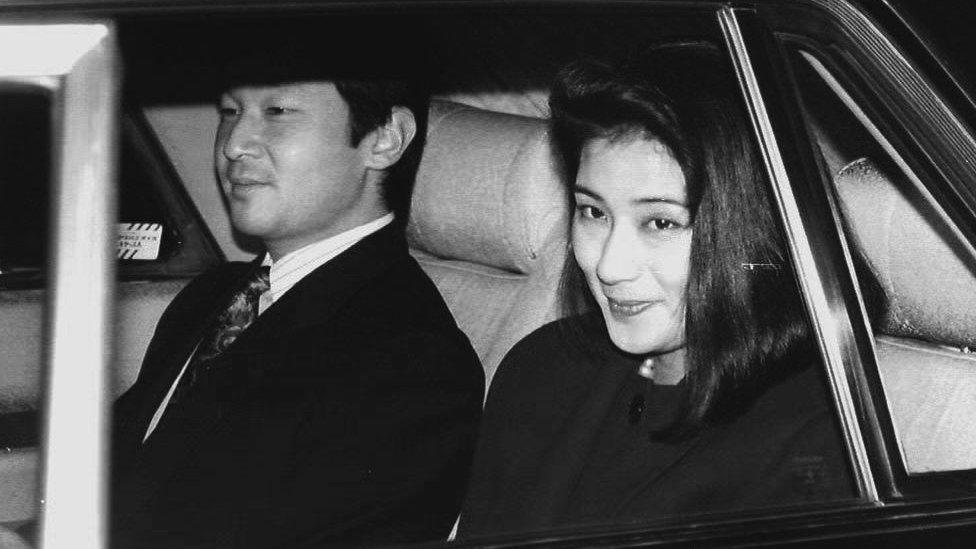
Crown Prince Naruhito reportedly met Masako Owada at a tea party for a Spanish princess
It was just after he returned to Japan in 1986 that he first met his wife.
Fluent in several languages, Masako Owada was an articulate Harvard graduate who had just passed the toughest of exams to become a top-ranked diplomat.
Their courtship took time, the delay attributed partly to Ms Owada's concerns about life in the highly conservative royal institution. But in 1993 she agreed to marry him.
She later told reporters, external that she accepted his proposal after he said: "You might have fears and worries about joining the imperial household. But I will protect you for my entire life."
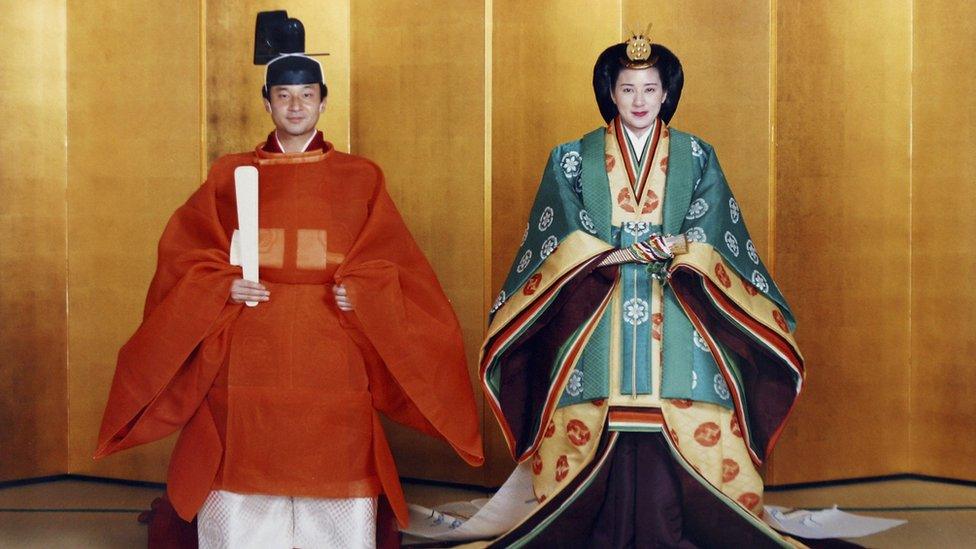
The royal couple married in June 1993 - a wedding watched across the nation
Once married, speculation raged over when they would produce a male heir.
Japan does not allow women to inherit the throne and neither of the prince's siblings had sons. Either a baby boy or a legal change was needed.
The royal couple must have felt the pressure. "If there's too much fuss, I think the stork might get annoyed," the prince said pointedly in 1994, external.
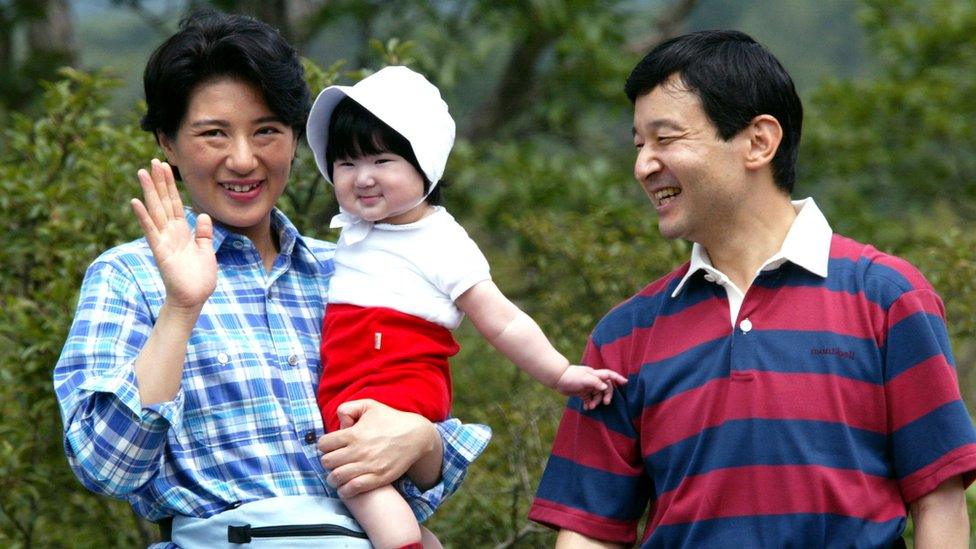
There were celebrations when Princess Aiko was born in 2001, but consternation over the succession
In 2001, the couple had a daughter, Princess Aiko, but this did not resolve the succession issue. Soon afterwards, Crown Princess Masako began to disappear from public view, amid speculation about her health.
At a press conference in 2004, matters appeared to come to a head. The prince told journalists, external his wife had "completely exhausted herself" trying to adapt to palace life. In unusually strong comments, he accused palace officials of "moves to negate" her character and career.
The palace then announced that the princess was suffering from an "adjustment disorder", now widely assumed to be a reference to depression. For a decade she remained - for the most part - largely out of sight.
The succession crisis was alleviated in 2006 when the prince's younger brother and his wife welcomed a baby boy, Prince Hisahito, and in recent years the princess has been more in evidence.
In 2014 she attended her first official banquet in 11 years, and a year later travelled to Tonga on an official visit. But the prince said in 2016, external that she was "still subject to ups and downs".
'Maudlin protection'
"Some women have been deeply moved by the crown prince's profound protection of Masako - you have to say that he followed through on his promise," says Prof Kenneth Ruoff, an expert on the Japanese imperial institution at Portland State University.
"But the far-right don't care for him - they find his protection of his wife to be maudlin."
He says the princess's illness has hampered the couple's ability to define themselves to the public, in contrast to the current imperial couple who had made clear what causes they backed before they assumed the throne.
While Akihito and Empress Michiko have been "timeless advocates" of bringing people with disabilities into mainstream society, he says, the crown prince and princess "haven't really taken on many new causes as a couple".
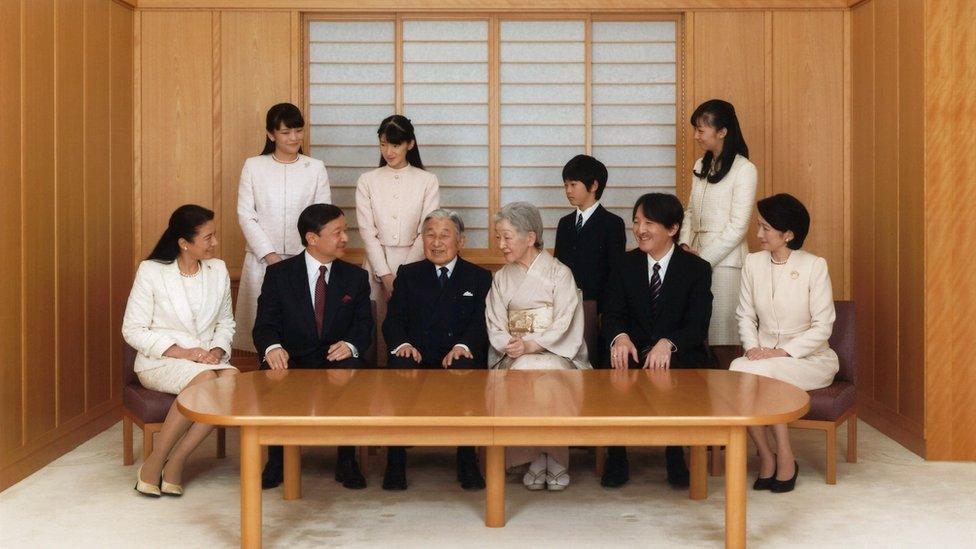
Prince Hisahito (rear, second R) is the heir to the Chrysanthemum Throne
The prince's known interests include music - he is a keen viola player - and medieval transport. At Oxford he studied water transport on the Thames and has spoken since of his love for the river.
Since his daughter was born, he has enthused about taking a hands-on role as a father. Internationally, he has embraced water management issues, speaking at several overseas conferences.
He has also veered into politics, though the imperial family is, under the constitution, meant to remain above such things.
In February 2015, as the world prepared to mark 70 years since the end of World War Two, he said, external it was "important to look back in a humble way on the past and pass on correctly the tragic experiences of war".
His comments were interpreted by some as a warning against a revisionist view of history to nationalist politicians.
It is this bloc which is seen as the biggest barrier to reforming the monarchy. As well as the succession problem, it is also shrinking because women must leave the royal family when they marry, as Princess Mako is soon expected to do.
Prof Colin Jones of Doshisha University says it is unlikely that the new emperor can play a role in that debate.
"The whole point of the current system is to prevent the politicised use of the monarch and so to prevent the monarch doing political things," he said.
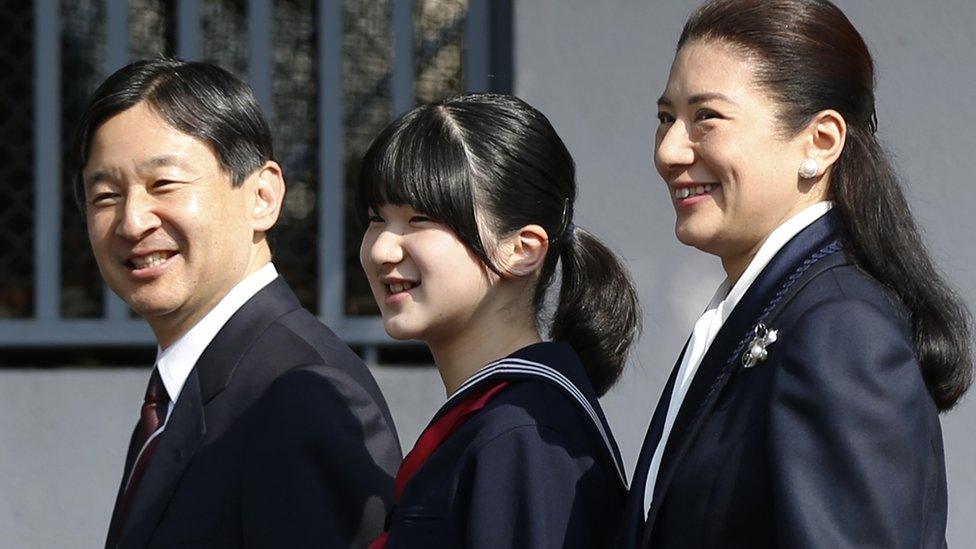
Crown Prince Naruhito and his family will take over the duties performed by his parents
But as emperor, Naruhito will be busy. The post is ceremonial, but there are constitutional roles to perform as well as cultural and public events.
"The real issue is one of logistics - if you look at who's available to do those things, it's not a very big pool any more," he said.
"The thing to watch will be the dynamic between the emperor and his younger brother [who is second in line to the throne and whose son Prince Hisahito is third] - it may be different to what people are accustomed to."
In his memoir of his time as a student at Oxford, the crown prince comes across as a cheerful and curious individual willing to embrace new experiences - something that will stand him in good stead in the years ahead.
Isao Tokoro, professor emeritus of Japanese history at Kyoto Sangyo University and an expert invited to give his views to a government-appointed panel on the abdication, says he is well-prepared for the future.
"The crown price has been educated to be emperor from the day he was born," he said. "I feel that it is very important for [him] to play the role and meet the needs of the times as much as possible."
- Published19 May 2017
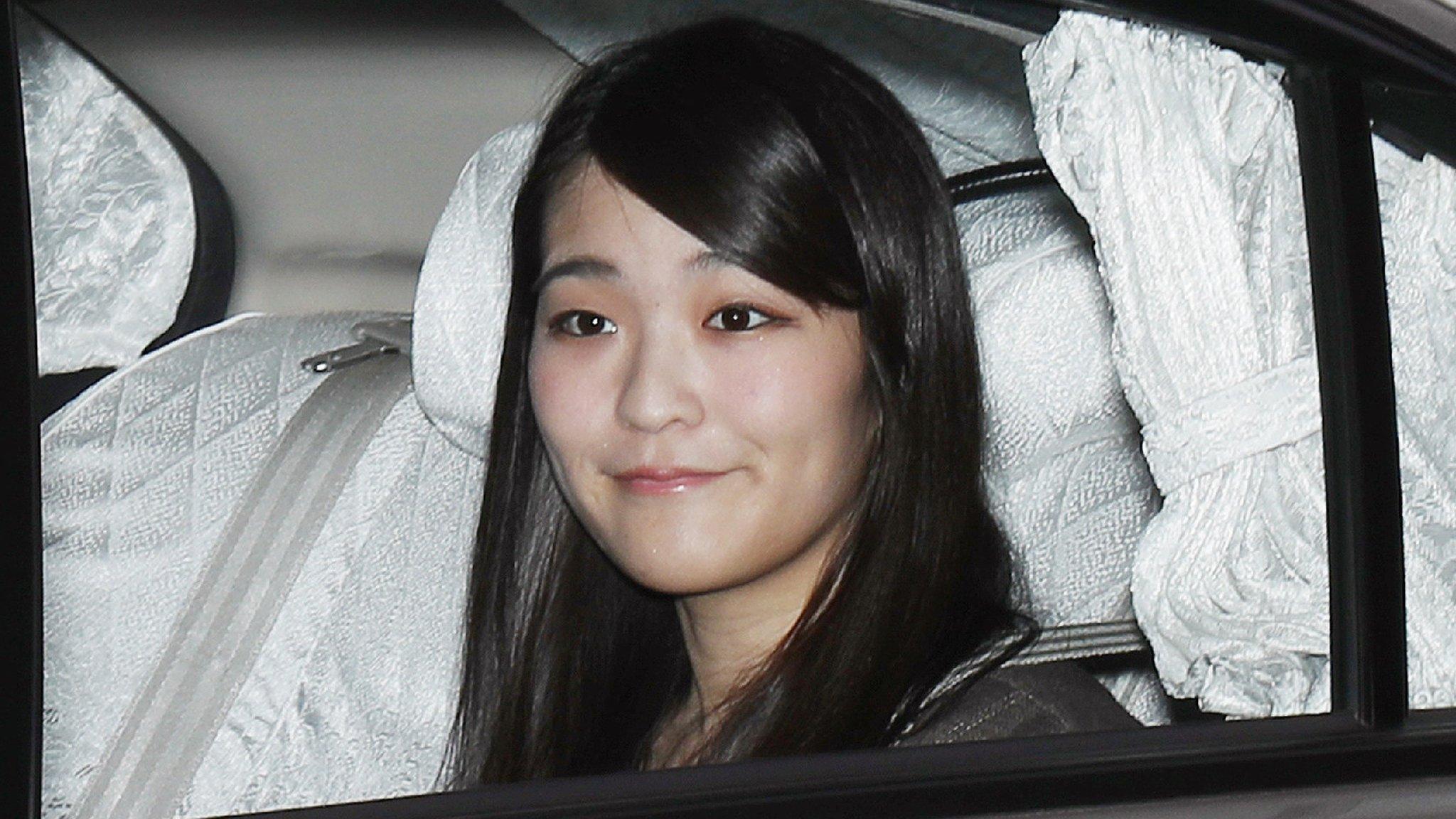
- Published8 August 2016
- Published30 April 2019
